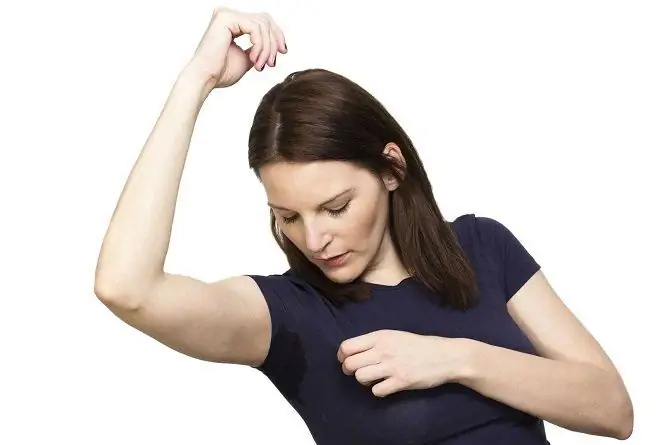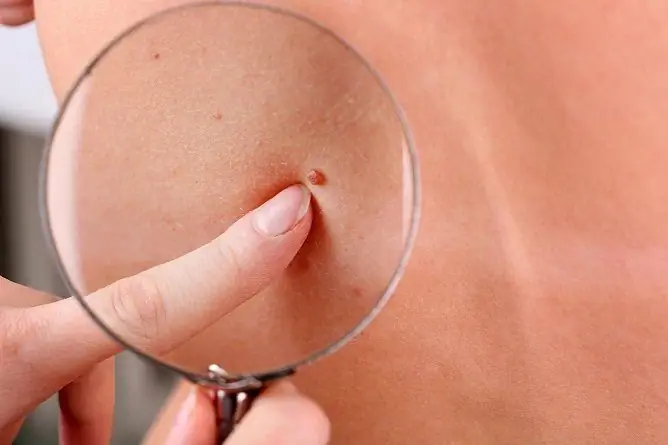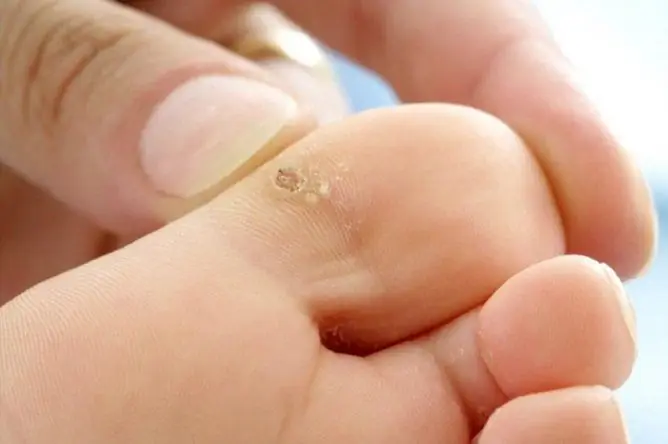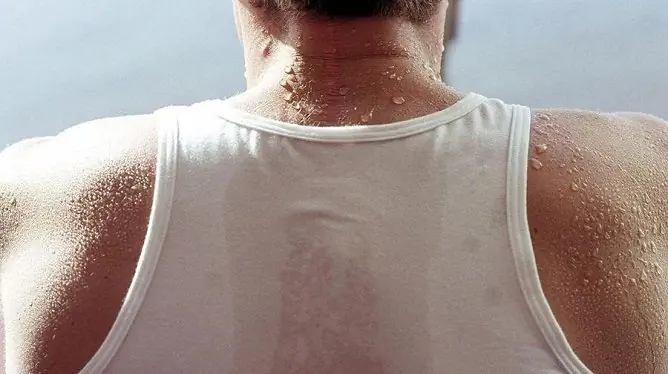- Author Rachel Wainwright wainwright@abchealthonline.com.
- Public 2023-12-15 07:39.
- Last modified 2025-11-02 20:14.
Heavy sweating in women: causes, treatment
The content of the article:
- What is hyperhidrosis
- Physiological hyperhidrosis
-
Reasons for the development of pathological hyperhidrosis
- Stress
- Overweight
- Adolescence or menopause
- Pregnancy
- Drug therapy
- Oncological diseases
- Elevated levels of catecholamines
- Hereditary predisposition
- Measures complementary to conservative therapy of hyperhidrosis of any etiology
- Video
The reasons for heavy sweating in women can be different. Some of them can be easily fixed, which allows you to quickly get rid of the existing problem. In other cases, it is very difficult or impossible to do this, then it is necessary to learn how to reduce the severity of the main symptoms - to stop the manifestations of sweating and eliminate the unpleasant odor that accompanies this violation.

Sweating can occur in women for various reasons.
Sweating is the body's normal response to temperature changes. At room temperature, about half a liter of sweat is released per day, and in hot weather, especially when combined with physical activity, a person sweats ten times more.
What is hyperhidrosis
Hyperhidrosis is a condition characterized by excessive sweating when sweating is abnormal. By the prevalence of the process, it can take the following forms:
| The form | Description |
| Local | It is localized in certain parts of the body: on the palms, feet, in the armpits |
| General (generalized) | Excessive sweating occurs throughout the body |
Constant increased sweating in both women and men can cause the development of certain diseases. So, with the localization of pathology on the legs, favorable conditions are created for the appearance of a fungus. When sweating in the axillary and groin areas, the sweat glands can become inflamed, which leads to purulent damage to the surrounding tissues.
Physiological hyperhidrosis
Sweating is normally worse in hot weather, with fever, and during exercise. In such cases, physiological hyperhidrosis performs the protective function of the body from overheating.

Sweating increases with physical exertion
Usually, at first, wet marks on clothes appear under the armpits, less often palms and feet are involved in the process.
Also, factors that increase the likelihood of developing hyperhidrosis include wearing tight shoes and clothing made of low-quality synthetic materials, an irrational drinking regime, and staying in stuffy rooms with high humidity.
Reasons for the development of pathological hyperhidrosis
Pathological hyperhidrosis is called inadequate sweating, which is caused by a number of neuroendocrine disorders. It is observed regardless of the temperature effect on the body.
With the secondary form of pathology, most often the whole body sweats. Other characteristic signs are the absence of dependence of the onset of symptoms on the time of day and maintaining a clear connection with the activity of the underlying disease (sweating decreases with recovery).
Stress
If increased sweating in women occurs with strong excitement, depression or fear, then the reason lies in the excitable nervous system (psychogenic hyperhidrosis). Usually, in this case, local areas of the body sweat - armpits, palms, nasolabial triangle, back, feet.

Symptoms of pathology can occur with stress
To get rid of this kind of problem, you need to seek the advice of a psychotherapist and neurologist. After identifying the provoking factors, the doctor will prescribe drug therapy. Sessions of psychotherapy are effective in such situations.
Overweight
It has been found that overweight people sweat more and more often. With excessive body weight, profuse sweating in women occurs even with slight excitement or an increase in ambient temperature, which is associated with metabolic disorders.

Overweight women sweat more
The main recommendation in this case is to follow a diet for weight correction. Take a shower at least twice a day, use antiperspirants.
Adolescence or menopause
These two periods in women are characterized by changes in hormonal levels. Therefore, throughout the year, the brain transmits the wrong signal about the state of the environment, as a result of which, even in hot weather, the body dilates blood vessels to keep warm.
Girls with teenage sweating should carefully follow the rules of personal hygiene and use the optimal antiperspirant that can stop the symptoms of hyperhidrosis.
Endocrine hyperhidrosis can also develop against the background of the following diseases:
- hyperthyroidism and other pathologies of the thyroid gland: most often a constant feeling of fever and increased sweating are the first symptoms, later on they are joined by severe irritability, insomnia, general weakness, etc.;
- pheochromocytoma: a tumor of the nervous system that synthesizes adrenaline and norepinephrine
- carcinoid syndrome: a tumor that produces hormonal substances that stimulate the sympathetic fibers of the nervous system.
Pregnancy
The period of pregnancy is characterized by increased sweating. If in the first trimester it manifests itself dimly, then for the second and third trimesters, a significant increase in the volume of circulating blood is characteristic, so the symptoms may appear more pronounced.
Hyperhidrosis in pregnant women does not require special treatment. In most cases, adherence to normal hygiene procedures is sufficient. It should also be borne in mind that the use of medical antiperspirants during this period is not recommended, so it is better to give preference to safe products.
Drug therapy
Against the background of the use of antibiotics, a sharp change in the intestinal microflora occurs, which causes severe sweating. To restore normal microflora, you can use natural fermented milk products (for example, kefir) or medicines containing bifidobacteria and lactobacilli.

Certain medicines may increase sweating
Sweat production is also stimulated by some drugs that affect the autonomic nervous system, including Acyclovir, Propranolol, Ciprofloxacin, Physostigmine, Pilocarpine, Insulin, antiemetics, Aspirin, antidepressants.
Oncological diseases
Hyperhidrosis develops due to the impact on the center of thermoregulation in the hypothalamus. Symptoms are most severe in the evening and at night, and usually involve the whole body.
Excessive sweating causes:
- lymphocytic lymphoma;
- histiocytic lymphoma;
- mixed lymphoma;
- Burkitt's lymphoma.
Most often, medical antiperspirants are used to relieve symptoms of hyperhidrosis.
Elevated levels of catecholamines
Catecholamines are substances that ensure the transmission of impulses in the nerve trunks and interaction in the body of cells. They appear in the blood in the following cases:
- pains of various etiologies;
- heart diseases;
- respiratory failure;
- drug or alcohol withdrawal symptoms;
- intense physical work.

If the symptoms of the disease do not respond well to relief, it is necessary to seek the advice of a doctor.
In order to find out exactly why excess sweat is formed, and to determine how this can be cured, it is necessary to contact a therapist and undergo appropriate research.
Hereditary predisposition
Disturbances of the thermoregulation system, in which primary hyperhidrosis is diagnosed, are transmitted from generation to generation. The causes of the pathology have not yet been established.
In such cases, the treatment can be long. It includes the following methods:
- drug therapy;
- physiotherapy;
- botulinum toxin injections;
- laser treatment;
- sympathectomy or local surgical treatment.
Measures complementary to conservative therapy of hyperhidrosis of any etiology
As a complement to the main treatment, the following measures are recommended:
- taking vitamins of group B: B 3 and B 5;
- organization of proper nutrition: spicy dishes, spices, coffee, honey, alcohol increase perspiration, therefore, they should be presented in a minimum amount in the diet;
- observance of the rules of personal hygiene: a contrasting or warm shower is recommended 2 times a day (possibly more often). Underwear should be made of natural fabrics that allow air to pass through and absorb moisture well;
- general strengthening of the body: it includes air baths, sea bathing, fitness classes, breathing exercises;
- external use of a decoction of oak bark: it is recommended to do baths with decoction 2-3 times a week for 15 minutes. It is an old and effective traditional medicine with a high level of safety. During bouts of sweating in the armpits, you can use gauze wipes soaked in broth.

To reduce the severity of manifestations of pathology, a contrast shower is recommended
In mild cases, compliance with these recommendations allows you to stop the manifestations of the disease and avoid expensive treatment.
It must be remembered that sweating is a normal physiological phenomenon. However, if sweat is secreted in excess throughout the year, this can be an alarming signal for the development of various diseases. When symptoms of hyperhidrosis appear, in order to find out the cause of their occurrence and find out how to properly treat the disease, you need to consult a doctor.
Video
We offer for viewing a video on the topic of the article.

Anna Kozlova Medical journalist About the author
Education: Rostov State Medical University, specialty "General Medicine".
Found a mistake in the text? Select it and press Ctrl + Enter.






